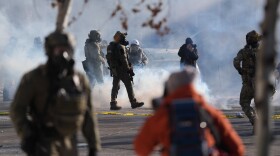President Donald Trump’s new rules on immigration enforcement have undocumented immigrants on edge.
Trump expanded the priority targets for deportation to include people convicted of minor crimes. And there are reports around the country of immigrants with no criminal records being swept up in raids.
That anxiety is being felt in North Carolina schools, where students who come from families with mixed immigration statuses are nervous, distracted, and sometimes absent altogether. Some schools are trying to find ways to respond to the increased anxiety. One Triangle charter school held a workshop earlier this month for families on how to deal with Immigration and Customs Enforcement, or “ICE”.
In the days following November’s election, a few desks sat empty in at least one sixth grade math class. They were desks usually filled by Latino students. But their teacher says those students stayed home, fearful of what Trump’s election meant for their family members, many of whom are immigrants without papers. She says now, her students are back in class, but anxiety is still high.
"Students voiced and even said things like 'My aunt has talked about going back to Mexico,' or, 'My mom is a little bit nervous so that is why she’s considering pulling me out of school,'" she explained.
"I've been here since 1996, not having a criminal record or anything, and I worry," said a Triangle-area undocumented mother of three.
WUNC is not identifying the school, its staff or its parents in this story because school administrators feared doing so could make its parents targets for immigration raids. That’s how worried they are. The fear surrounding immigration enforcement is also why administrators decided to hold a workshop for families about how to deal with immigration officials. On a recent school night, several dozen parents, Latino and white, documented and undocumented, watched a presentation in the middle school common area.
Viridiana Martinez is with the Durham-based immigrant rights group Alerta Migratoria. She went through what families could expect if they’re detained.
"Don’t just hire an attorney. Hire a good attorney," Martinez told audience parents.
In the audience was one undocumented mom originally from Mexico, who has three U.S.-born kids. She said she’s been on edge since Trump’s election.
"He’s ready to deport more people whether or not they have a criminal record," she said. "I’ve been here since 1996, not having a criminal record or anything, and I worry."
The mom said her children, all teenagers, are worried too, especially her oldest son. She drives her kids to school every day, knowing that an encounter with law enforcement could result in deportation. When asked if she’s afraid to make the trip, she said, "The truth is yes. But I’ll take the risk for my children."
The school’s director was inspired to set up an ICE workshop after looking at similar programs in California. He said the school is also drafting a response plan for a possible ICE encounter.
"We have recognized within some of our students different levels of fear and anxiety," said a school administrator.
"So it would be if an ICE officer does present himself at school, that there’s clear steps in which administration follows," he explained, adding that one of those steps is requiring ICE to get a warrant to enter the school.
The director is also working with other local charter school leaders to develop best practices for creating a buffer between immigration enforcement and students. Some traditional public schools are also exploring ways to support students from immigrant families. Workshop leader Viridiana Martinez said school communities are important places to have those kinds of discussions.
"Schools are at the heart of our communities," she said. "Here, we find directly impacted people, allies, people who are just concerned about the fear and what is going on. People are looking for answers, people are looking for empowerment, people are looking for a way to fix this."
Martinez said a number of local traditional public schools have expressed interest in bringing the ICE workshop to their parents too.










